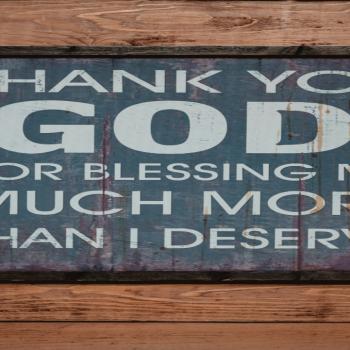Christians are no better at navigating the American political landscape than anyone else. The name-calling among them may have a religious ring to it, but it is depressingly similar to the tribal incivility on display everywhere else. And, sadly, when we are commenting on the larger political drama we drop the religious language and we are as nasty and unreflective as the talking heads on Fox or MSNBC. Some of the epithets I have watched Christians use in political observations on Facebook aren't even fit to reprint here.
For that reason, I am not at all sanguine about Christians transcending the terms of the current debate. That doesn't speak well for the rest of the claims that Christians make and that's deeply troubling.
Christians will necessarily commit themselves to a point of view, but they should all be committed to the pursuit of the truth, wherever it leads. They should be tenacious about gathering the facts. They should be scrupulous about avoiding distortion. They should be committed to civil and incisive debate about the issues. They should foreswear name-calling and character assassination. And they should be capable of considering solutions to the problems that face us that lie outside the ideological parameters on both the left and the right. If we can't do that, we really add little or nothing to the public debate.
But on balance, that is not what we do. We are not better informed. (We are, in fact, often poorly informed.) We don't sit with the facts. More often than not, the positions we assume are thinly veiled versions of the same views already on offer. And, although the last thing public discourse needs right now is another glass of venom with a religious chaser, we are adept at reminding people that they aren't "real" Christians or appropriately concerned about the poor.
That behavior invites abuse and it is not surprising that politicians on both sides of the aisle exploit our beliefs to enlist our support. But let's be honest. It's no more cynical than the use we make of faith in supporting our political views.
Before we wade in, sound off, and throw our elbows to the left and right next time, here are some things that might be worth remembering:
First, there is probably nothing in the Old or New Testament that can be applied directly and unequivocally to the debates that we are having. Ancient Israel was a theocracy with a king. The early Christian community was a church, not a country. The early church described in the Book of Acts was a minority movement within its own world. Its members did not exercise responsibility for shaping Roman policy. They did not issue currency and they did not elect representatives. So, we live, work, and vote in a completely different environment than those in which the books of the Bible were written.
We can debate the merits of big government, the size of federal budgets, the structure of the tax code, and the advisability of creating a welfare state. But the early Christian community described in the opening chapters of the Book of Acts, in which "all things were held in common and no one suffered need," is not a model for nation-building and it is not a model for creating a thriving, modern economy. To suggest otherwise is to rely on sloppy exegesis and anachronism. It is logically misleading and romantic nonsense.
Second, for that reason, constructive, realistic (and even faithful) decisions will reflect the complexity of modern life and economies. The easy demonization of systems and individuals is a distraction. Real answers to the problems we face will be complex and subtle. They will also include a complex mix of considerations: job creation; budgetary discipline; a restructured tax code; modifications to a social safety net that did not anticipate the demographics we face today; as well as the prioritization and elimination of entitlement programs. These are morally neutral issues that are part of an economic calculation and they need to be treated as such. Taken together we may want to evaluate the net effect of our decisions from a theological or moral point of view, but it is not helpful to pit care for the poor against the creation of wealth. We could take everything from the wealthy and live quite nicely for a few weeks as a country. But practically and morally speaking that's an approach that makes no more moral, political, or theological sense than kicking the poor to the curb.
Finally, when the political debates are over, Christians will still have the same obligations. We misunderstand the nature of the Gospel when we insist that the government has the obligation to defend Christian values, or that voting for federal aid discharges our obligation to the poor.





